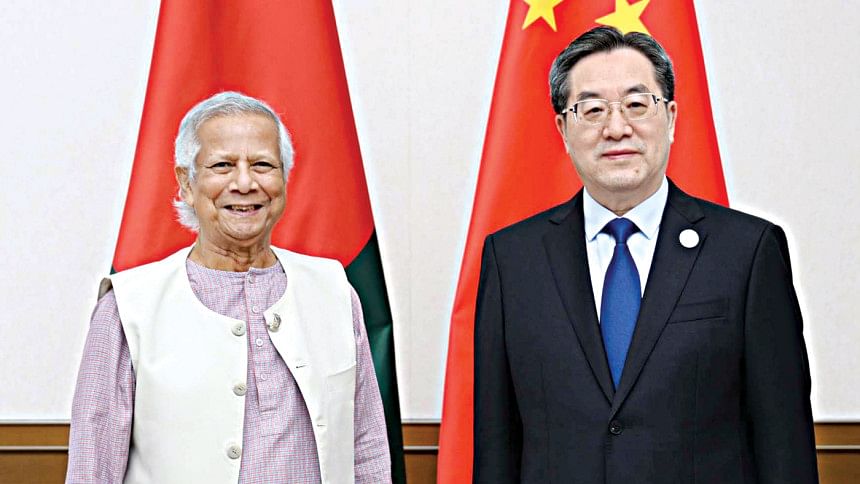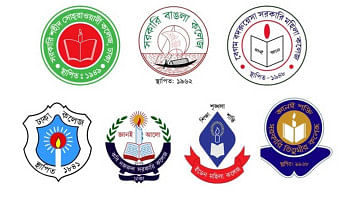Unite to ensure Rohingya repatriation

Chief Adviser Prof Muhammad Yunus yesterday said as global efforts to deal with the Rohingya crisis are drastically shrinking, Asian leaders must come together to ensure the refugees' safe and dignified repatriation.
"The protracted crisis in Myanmar threatens regional stability", Yunus said while addressing at the Boao Forum for Asia Annual Conference 2025 in Hainan, China, with the theme of "Asia in the Changing World: Towards a Shared Future".
Yunus joined the forum on the second day of his four-day visit to China. Boao Forum for Asia, based in China, is an international organisation and promotes economic integration in Asia. Its mission is to pool positive energy for the development of Asia and the world.
The chief adviser said for more than seven years, Bangladesh has been hosting over 1.2 million forcibly displaced Rohingyas. "We continue to bear significant social, economic, and environmental costs."
On global conflicts, he also said that in today's poly-crisis world, wars, and conflicts erode rights and disrupt economies.
The genocide in Gaza continues despite global condemnation. The crisis in Palestine is not just an Arab or Muslim concern, it is a humanitarian issue. The continued tension in Ukraine is heavily tolling on global supply chain.
Yunus said the forum takes place at a critical juncture. Global governance under multilateralism is being questioned. Geopolitical tensions are rising. Climate change is escalating. Debt burdens are unsustainable. Humanitarian crises are growing, according to the full text of his speech shared by the chief adviser's press wing.
Political will for development cooperation is weakening. The world faces an alarming shortfall in collective action.
Asia, home to 60percentof the global population and 55percentof global GDP, is at the centre of these changes. Emerging norms, regulations, and technologies are reshaping governance and economic policies. Assumptions that shaped policies a decade ago are no longer relevant. The need for regional and global cooperation has never been more pressing.
"As we build a new Bangladesh, we face multiple challenges that are shared by other Asian countries. In particular global financial market instability, political uncertainties, diplomatic tensions, and trade disruptions create volatility. Rising interest rates and debt servicing costs are deepening Asia's debt crisis," Yunus said.
Despite global commitments to the 2030 Agenda, progress is slow. Only 24 percent of SDG targets have been met. Developing Asian countries face an SDG financing gap of 2.5 to 4 trillion US dollars annually. Beyond SDG financing, Asia also needs large-scale investments in infrastructure and economic diversification through responsible financing.
Bangladesh has been a victim of corruption and illicit financial flows. These corrupt practices cost developing countries an estimated 1 trillion US dollar annually which is multiple times more than the total ODA they receive. "Asia should stand united to establish a multilateral mediation mechanism for asset recovery and return," Yunus said.
In this changing world, the destinies of Asian countries are intertwined. "We must chart a clear roadmap for a shared future and shared prosperity."
At this forum, Asia must step up and strengthen cooperation in four key areas -- financial cooperation, trade cooperation, food and agriculture cooperation, and technology cooperation, Yunus said.
Asia must create a sustainable financing mechanism. Regional multilateral development banks and similar institutions should lead this effort. "We need reliable funds that address our challenges and meet our growing demands," the chief adviser opined.
Asia remains one of the least integrated regions. This weak integration stifles investment and trade. "We must work to boost trade cooperation immediately," he urged.
Asia must promote resource-efficient farming. Domestic production must be enhanced for food security. "We need to reduce import reliance and achieve self-sufficiency," Yunus added. Expanding tech-based sustainable agricultural solutions and innovation in regenerative and climate-smart farming is the key.
Asia must build a strong tech ecosystem, which should be restorative, distributive, and inclusive. "We need to share knowledge, data, and invest in technology incubation and innovation. Collaboration on digital solutions will drive progress," the chief adviser said.
Yunus also mentioned that food security is under increasing pressure. Rising prices of essential commodities are straining household budgets, especially for low-income families.
Climate change and natural disasters are exacerbating this crisis. Strengthening food supply chains is essential. Energy security is critical, especially for net-importing developing countries.
Energy supply disruptions drive inflation, economic instability, and debt distress. "We must find sustainable energy solutions and scale up investments in renewables," the chief adviser said.
Investing in health and education is crucial for human capital development. A well-educated, skilled workforce drives economic growth and innovation. Countries that invest in universal healthcare see better economic productivity. Digital education and vocational training must be expanded to equip our youth for the jobs of the future, Yunus added.
Ban Ki-moon, former secretary-general of the United Nations and chairman of the Boao Forum for Asia, Ding Xuexiang, executive vice-premier of the state council of the People's Republic of China, among others, spoke at the session.

 For all latest news, follow The Daily Star's Google News channel.
For all latest news, follow The Daily Star's Google News channel. 



Comments